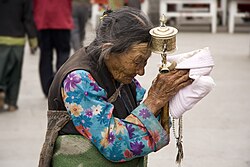
The continuity theory of normal aging states that older adults will usually maintain the same activities, behaviors, relationships as they did in their earlier years of life.[1] According to this theory, older adults try to maintain this continuity of lifestyle by adapting strategies that are connected to their past experiences.[2]
The continuity theory is one of three major psychosocial theories which describe how people develop in old age.[3] The other two psychosocial theories are the disengagement theory, with which the continuity theory comes to odds, and the activity theory upon which the continuity theory modifies and elaborates. Unlike the other two theories, the continuity theory uses a life course perspective to define normal aging.
The continuity theory can be classified as a micro-level theory because it pertains to the individual, and more specifically it can be viewed from the functionalist perspective
- ^ American Society on Aging. "Continuity theory: How elders find wisdom in spite of it all". Archived from the original on 2008-01-11. Retrieved 2007-12-16.
- ^ Atchley R. C. (1989). "A continuity theory of normal aging". The Gerontologist. 29 (2): 183–190. doi:10.1093/geront/29.2.183. PMID 2519525.
- ^ Priscilla Ebersole (8 April 2005). Gerontological nursing and healthy aging. Elsevier Health Sciences. p. 108. ISBN 978-0-323-03165-3. Retrieved 4 June 2011.